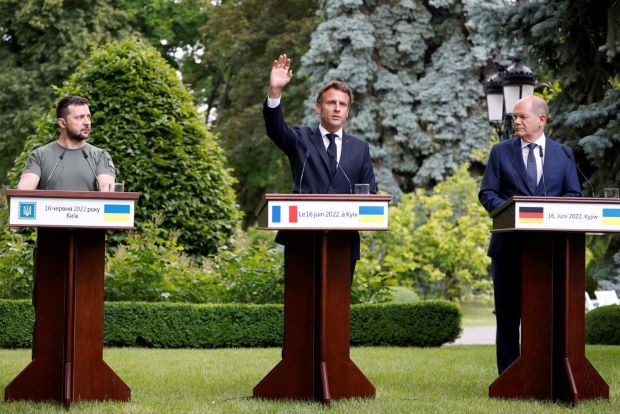European leaders assure Ukraine of support, but questions remain

By Aurelien Breeden, Andrew E. Kramer, Matina Stevis Gridneff, Katrin Bennhold and Anton Troianovski
KYIV – European leaders visiting Kyiv expressed support on Thursday (16) for making Ukraine a candidate for membership in the European Union, a show of solidarity that comes amid questions over their backing of President Volodymyr Zelenskyy and his calls for heavier weapons to offset Moscow’s artillery advantage.
President Emmanuel Macron of France, Chancellor Olaf Scholz of Germany and Prime Minister Mario Draghi of Italy follow a host of European leaders who have travelled overland to Ukraine’s capital with air travel off limits because of security concerns. US Secretary of State Antony Blinken Defense Secretary Lloyd Austin made the journey in April.
Macron said that the three leaders and President Klaus Iohannis of Romania, who was also in Ukraine, supported granting Ukraine EU candidate status and that France would deliver six additional Caesar truck-mounted howitzers in the coming weeks, on top of the 12 that France has already delivered.
“We are and we will remain by your side in the long run to defend your sovereignty, your territorial integrity and your freedom,” Macron said at a news conference in Kyiv. “This is our goal, we have no other and we will achieve it.”
Scholz on Thursday also publicly expressed support for Ukraine’s EU candidacy, saying that he and his fellow European leaders had come to Kyiv with a clear message that “Ukraine belongs to the European family.”
The European Commission is to publicly make its official recommendation on Ukraine’s application on Friday, in another potential step toward bringing Ukraine into Western Europe’s sphere of influence.
In recent days, criticism had mounted within Ukraine over the perception that European officials — and Macron in particular — were seeking to pressure Zelenskyy into peace talks with Russia. But on Thursday, the visiting leaders insisted that any timeline for peace would be in Ukraine’s hands. And Scholz said he supported the idea, expressed by Macron, as well, that “Russia cannot impose a path to peace, it cannot get away with giving Ukraine conditions that cannot be accepted, neither by Ukraine nor by us.”
The European leaders also travelled, along with Iohannis, to Irpin, a Kyiv suburb where investigators are looking into reports of Russian atrocities during the war. Scholz lamented the destruction that the war is causing, and said in Irpin, “It is even worse when you see how terribly senseless the violence is that we are seeing here.”
Russia dismissed their visit as empty symbolism. Dmitry Medvedev, the former Russian president who is vice chairman of President Vladimir Putin’s Security Council, on Thursday disparaged the French, German and Italian leaders as “European connoisseurs of frogs, liverwurst and pasta.”
Ukraine’s plea for more weapons has grown more urgent in recent weeks as Russian forces extend their grip over the eastern Donbas region. But the war has raised far broader questions for the European Union as it debates how best to support a nation facing the biggest invasion on the continent since World War II.
For now, the response has been military aid for Kyiv and rounds of punishing sanctions on Putin’s government and many of those close to him. EU nations are also trying to reduce their reliance on Russian energy.
At the same time, European leaders have been forced to deal with the far-ranging consequences of the invasion — rising energy prices and inflation, a brewing global food crisis tied to Russia’s blockade of Ukraine’s grain exports and the exodus of millions of Ukrainian refugees to neighbouring nations.
-New York Times

